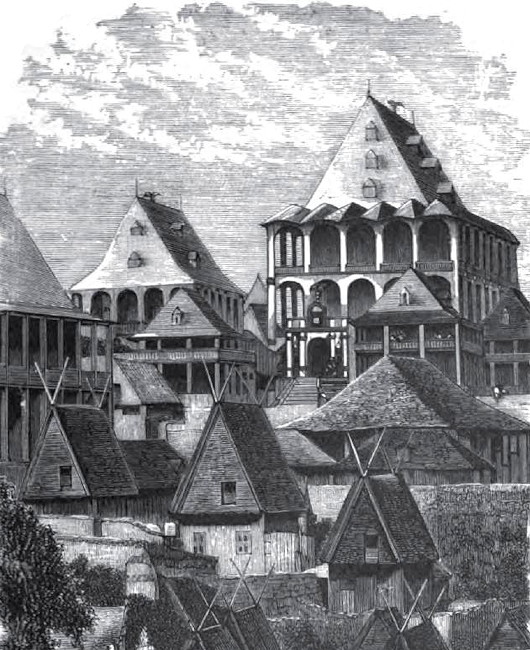About Daily Cusack
The daily blog of Andrew Cusack: a writer, historian, web designer, and volunteer with the homeless, handicapped, and elderly. Formerly of New York, Buenos Aires, Fife, and the Western Cape; I'm now based in London. read more
Blogs
- Rorate Caeli
- First Things blog
- Sancrucensis
- Ex Laodicea
- Millinerd
- American Conservative blogs
- Spoils of Egypt
- Sam Kriss
- Paraphasic
- Eunomia
- Irish Aesthete
- Classicist
News
- BBC News
- Daily Telegraph
- Spectator
- Catholic Herald
- First Things
- American Conservative
- New Criterion
- London Review of Books
- Frankfurter Allgemeine
- Neue Zurcher Zeitung
- ConservativeHome
- CapX
- Arts & Letters Daily
- Buenos Aires Herald

The Rova of Antananarivo
The Tranovola (left) and Manjakamiadana (right) in the Rova of Antananarivo.
The Manjakamiadana (“Where It is Pleasant to Rule”) was the royal residence, later pretentiously clad in stone by Protestant missionaries, while the Tranovola (“Silver House”) was where the nefarious Rainivoninahitriniony received foreign diplomats after the nobles’ coup of 1863.
His complicity in the supposed regicide of that year — no one’s really quite sure what happened to Radama II — eventually led to his downfall two years later. His younger brother Rainilaiarivony proved a more skilful political operator, succeding Rainivoninahitriniony as prime minister and arranging his own marriage to the last three queens of the Merina kingdom of Madagascar.
19 January 2016 9:00 am | Permanent Link | 2 Comments »

Comments
Leave a comment

19 Jan 2016 7:09 pm
Anybody got a recording of these people actually saying those hallucinogenic names?
I knew someone from Thailand some thirty years ago whose name I would never have remembered if he had not actually spoken it. Because he did I still know it by heart: Konkasem Kasemsri. It’s the rhythm.
And what were the queens called?
.
19 Jan 2016 11:48 pm
Queen Rasoherina (born Princess Rabodozanakandriana in 1814), Queen Ranavalona II (born Princess Ramoma, 1829) who Christianised the court (Protestant, alas), and the final Queen Ranavalona III whom the French exiled to Algiers where she became a patroness of the local Red Cross.